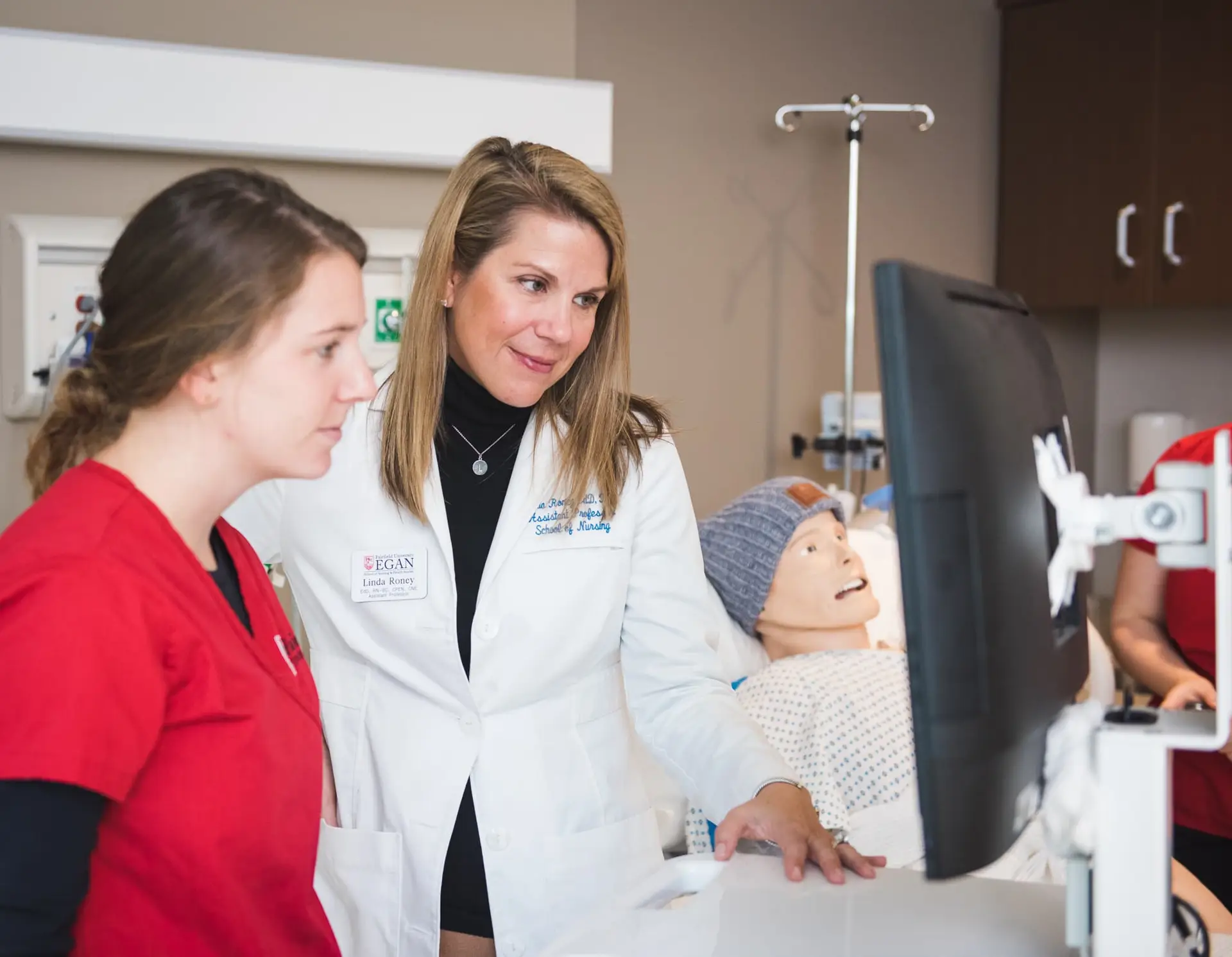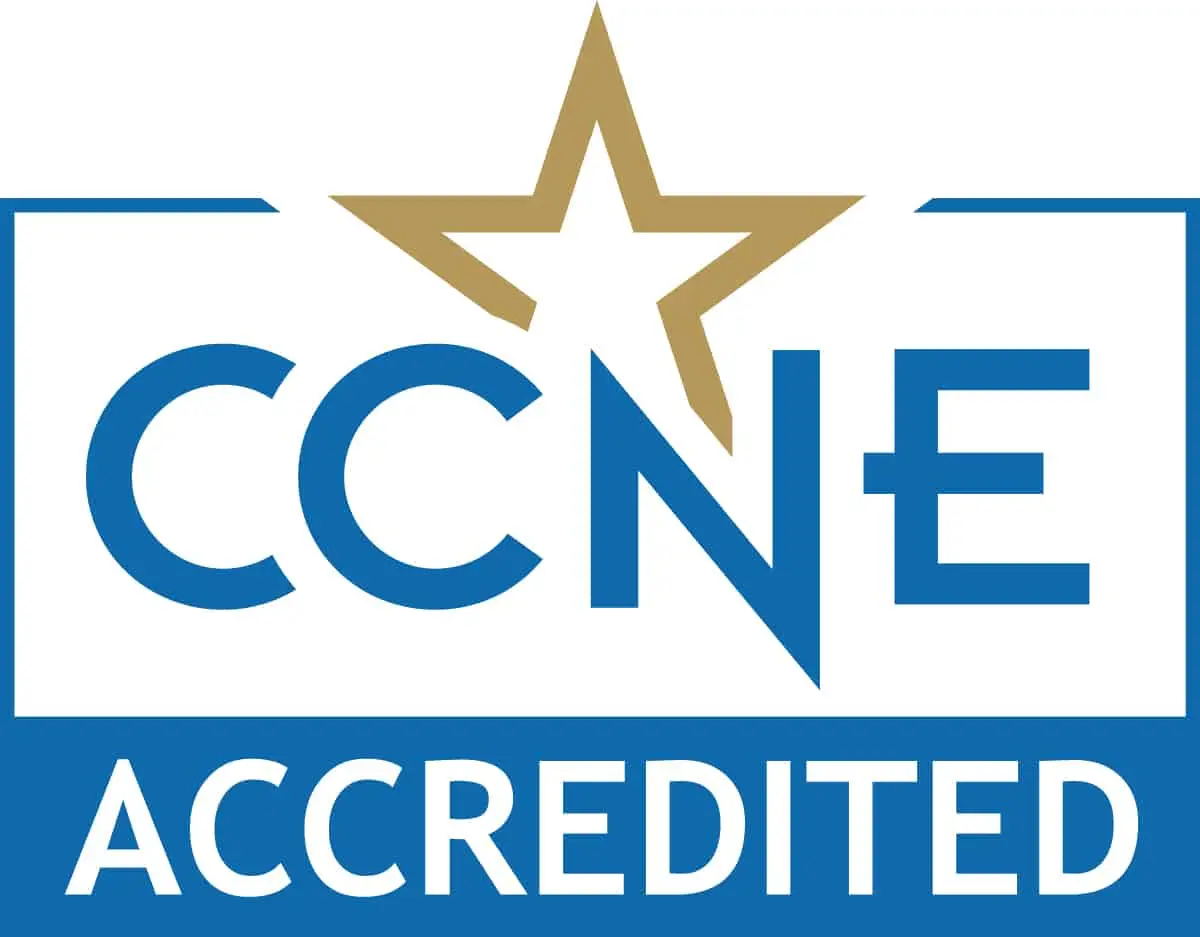Online Post-Master’s Doctor of Nursing Practice (DNP)
Develop the advanced clinical skills needed to deliver exceptional care.

Your Journey Starts Now
Guidance Every Step of the Way
Why Choose a Post-Master’s Doctor of Nursing Practice degree from Fairfield?
One-on-One
Support
Our dedicated Faculty Doctoral Advisors and program director offer personalized attention throughout the duration of the program, ensuring continuous guidance and mentorship to support your growth.
Flexible
Online Degree
Achieve a work-life-education balance with our flexible online degree. Explore the opportunity to transfer earned immersion hours from your previous master’s degree and fulfill additional hours at your organization or a location that suits your professional needs.
Extensive
Network
Gain access to our impressive healthcare industry network, offering opportunities to support your community-based projects and connections to a lifelong professional network.
Nursing Education
Opportunities
As the demand for nurses rises, a DNP can position you to meet requirements for teaching, making a significant impact in the evolving field of nursing.
Program Specifics
Fairfield University’s online Doctor of Nursing Practice (DNP) degree represents the highest academic preparation for nursing practice, focusing on expanded scientific knowledge related to providing comprehensive direct care across all settings. Grounded in clinical practice, the DNP moves the focus of advanced practice nursing from the level of the individual patient to the population level by using a cross-population perspective to assess, manage, and evaluate common problems.
The DNP program prepares students for advanced nursing practice by developing their ability to independently provide culturally sensitive, evidence-based care and demonstrate critical thinking in healthcare management. Students will learn to translate research into practice, integrate science and theory for reflective practice, and evaluate outcomes through healthcare information systems and fiscal analysis.
- Program Starts: Fall (September), Spring (January)
- Application Deadline: Fall Priority: July 15, Spring Priority: December 1
Applications will be accepted after these dates if space permits - Schedule: Full-time or Part-time
- Credits: A minimum of 32 credit hours.
- Completion: 18-24 months

Upon completing the Doctor of Nursing Practice, you will acquire the relevant knowledge and practical application needed to navigate the healthcare industry successfully and provide mentorship to fellow nursing professionals. You will gain experience in healthcare information systems, fostering collaborative relationships, and assuming leadership roles in policy analysis and development at various levels.
As a graduate of the Egan School DNP program, you will:
- Independently provide culturally sensitive and evidence-based care to individuals and populations in a defined area of advanced nursing practice.
- Demonstrate critical thinking at the highest level of practice and accountability in the management of healthcare systems, considering ethical, legal, and socially just patient-centered care.
- Translate research into practice through critique of existing evidence, evaluation of outcomes, and implementation of projects that contribute to the development of best practices.
- Integrate science and theory from nursing and related disciplines within a reflective practice framework to inform clinical judgments, resolve dilemmas in healthcare, and serve as a patient care advocate.
- Evaluate patient, population, and healthcare system outcomes using fiscal analysis and cost-effective strategies to achieve quality improvement.
- Analyze the use of healthcare information systems and patient care technology to assure quality healthcare outcomes.
- Lead collaborative interprofessional relationships and partnerships to transform healthcare delivery systems and improve health.
- Assume a leadership role in the analysis, development, implementation, and evaluation of policies to improve healthcare delivery and outcomes at the local, regional, national, and international levels.
Tuition for the Post-Master’s Doctor of Nursing Practice program is $39,040 ($1,220 per credit hour).
*Tuition may change due to number of credit hours needed
(not including books and fees.)
Please see the Tuition and Financial Aid page for more information.
The DNP program is open to students with a conferred bachelor’s degree and master’s degree in nursing from a regionally accredited institution. A GPA of 3.2 or better is preferred but not required.
No GMAT/GRE required.
Here’s what you will need to apply:
-
- A completed online application.
- A non-refundable $65 application fee paid by credit card. (Application fee is waived for current Fairfield students and for anyone who attends an information session.)
- A professional resume. Applicants are required to submit a current resume that includes employment and education history.
- A personal statement addressing the following questions:
- Discuss a practice problem in your field that, in your experience, has a broad impact on patient care outcomes.
- State professional goals for the next 5-10 years.
- Explain how a DNP degree will aid you in reaching your goals.
- Official transcripts from all colleges and universities attended. All foreign transcripts must be evaluated by an approved evaluating service.
- Two Recommendation Forms and Letters – one of which must be from a current supervisor or professor who can assess one’s clinical expertise and academic potential, accompanied by the University recommendation forms. The second recommendation may be from another professional or academic reference but should not come from a staff nurse peer.
- Copy of current active, unencumbered RN license.
- Documentation of the number of immersion hours completed in previous MSN program.
- All candidates will be interviewed after all application materials have been submitted.
The Egan School of Nursing and Health Studies is accredited by the Commission on Collegiate Nursing Education.
Faculty Spotlight
Career Outcomes
We offer a career-relevant curriculum aligned with job-ready skills, practical industry experiences, and real-world tools to prepare you to lead in an analytics role. Leverage our extensive alumni network and unrivaled career resources to support your next career move.

Degree Courses
Fairfield University’s online Doctor of Nursing Practice program offers a practice-focused curriculum designed to prepare advanced nursing leaders for clinical and organizational excellence. Students develop expertise in evidence-based practice, epidemiology, biostatistics, healthcare policy, leadership, and interprofessional collaboration, while applying research translation and informatics to improve patient outcomes. The program equips graduates to lead healthcare initiatives, implement innovative solutions, and drive meaningful change in complex healthcare environments.
- YEAR 1: Fall Start
- YEAR 2
Fall Semester (7 credits)
Spring Semester (7 credits)
Summer Term (7 credits)
Fall Semester (6-7 credits)
Spring Semester (6-9 credits)
Total Credits – 32 (max 37)
Fairfield Mission
Visionary by nature. Jesuit through mission. Transformative by design. Our mission inspires us to impact the world. It prompts us to ask important questions, to embrace our social responsibilities, and to lead by example. It’s what has made us a premier institution in the Northeast. Let the mission be part of your journey.




